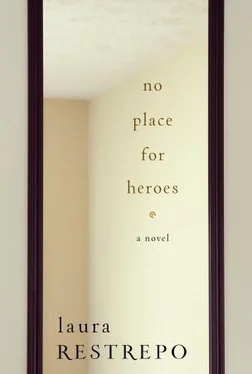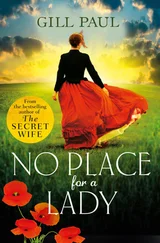“Boxes full of jewels! That must have cost a fortune …”
“They were Chinese jewels, kiddo, cheap fake stuff. The boxes were covered in dust, anybody would be able to tell that the merchandise wasn’t moving. But it was his minute. As soon as your father took out a box, he replaced it with another one, and so he kept the neighbors from suspecting.”
From outside on the street, Mateo wanted to look inside the window, hopping up, but he came up short.
So he brought over some bricks from the abandoned lot, stacked them, and stood on top of them, putting his hands on the sides of his face to block the reflection on the glass.
“What do you see?” Lorenza asked from below.
“It’s empty. No one lives here.” Mateo jumped down to the sidewalk.
“If you want, I can ring the bell, kiddo, see if we can talk with some of the neighbors, someone who knew your father. I can say that we lived here a long time ago. Maybe they have keys and we can go in the room, so what if it’s empty. Or better yet, maybe it’s for rent and they’ll show it.”
“You go ahead. I’m going to see what they have in the market.”
“Let’s go together. But tell me what you saw through the window, if the floor has greenish tiles like I remember—”
“I don’t know, I couldn’t tell.”
“Wait for me here. I want to look.” Lorenza went back to the window, added a few bricks to the stack, climbed up on top, and a few moments later was looking for Mateo in the market.
“The floor is green, kiddo!” she screamed at him when she saw him down an aisle. “A milky green, veined with white.”
“Great news,” he laughed. “Veined with white.”
The day Lorenza had arrived for the first time, the floor tiles had recently been mopped with lavender water. The whole place smelled like lavender, because Forcás had just cleaned to welcome her. And he had cleared a couple of shelves above the records and told her she could put her clothes there as he helped her unpack. It was a whole big moving-in ceremony, and although they didn’t mention it, it was clear that it was a solemn occasion for both of them.
“I saw the patio,” Mateo said, checking out the slabs of meat on the counter. “You could see all the way out back. Small, smaller than I had imagined.”
“We did everything on that tiny patio,” Lorenza said. “Even roasted meat on Sundays during the summer. Miche had hung a mirror on the back wall, right between the potted plants that we used to comb our hair. And since there wasn’t a sink inside, we washed pots, dishes, and clothes in the basin, as well as cleaned our hands and brushed our teeth. In the winter you had to be quick about it; funny to have to wear a coat to brush your teeth.”
“Nice,” Mateo smiled. “Everything in the open air, like farmers. In the middle of the city, Forcás lived like a farmer. I like that. Now I see how his name became him.”
“In the summer things got ugly. Because the heat and humidity were so suffocating, you barely stepped outside the range of the fan before you began sweating buckets. But in the winter it was pleasant, that’s the truth. I returned to the house each evening about eight or nine and I loved finding your father leaning back on a chair, sipping his maté, with the cats on his lap and his feet resting on the open oven door.”
“His feet must have charred,” Mateo said.
“He had his shoes on. It was a gas oven and since there wasn’t any heating, we kept it on and open so that the place stayed warm. But in general, we wouldn’t see each other during the day. We both left early to fulfill our tasks for the party, not having any idea where the other one was, and it was nice to come back at night and realize that the other one had returned unharmed. I swear, Mateo, the reunion each night was a gift. When you go fearing the worst, it’s a relief to find out that nothing has happened. And so we passed the time, day by day, very much in love, not knowing about what was going to happen the next day, not guessing too much either.”
“Were you scared?”
“When I remained alone in the house.”
Sometimes Aurelia had to stay alone for the night in Coronda, because Miche, who ran a collective, had the night shift, Azucena wasn’t home yet, and Forcás was traveling. She locked the door securely and bundled herself up in the Aymara blanket, Abra and Cadabra curled up by her feet, and began to feel as if the panic that spread throughout the neighborhood outside seeped in through the cracks in the wall and flooded the room. She couldn’t fall asleep for thinking of the basements where people bled to death in the dark, their fingernails ripped off; of the pregnant woman from the neighborhood who had disappeared the week before; or of a comrade who had turned up cut to pieces in the gutter. When she heard the sound of a lone motor outside, she stood on the bed to look out the window and her blood went cold if it was a green Ford Falcon without plates, the fed cars, the true vehicles of death, which now and then parked in the empty lot across the street. Fortunately, around four, the trucks began to arrive to unload and that was the saving grace, life returning with all its noise to frighten off the ghosts, and then finally Aurelia could sleep, lulled by the voices of the truck drivers, which in the coldness of dawn offered each other some maté, or a Faso. It was a sign that the night had been left behind and that she was safe, and she slept soundly until six, when Miche, who returned from his shift, came into the room without knocking, with the day’s newspaper in one hand and bags of the night’s business in the other, to talk about the news and ask if she wanted breakfast. It was an issue trying to convince him that he had to knock before coming in; she never finally succeeded. He argued, convincingly, that no one should have to ask permission to go into his own bathroom. Besides, the kitchen was his domain; he was the one who generally cooked for everyone, and it was pretty tasty, especially his milanesas with puree and salad. Before working in the collective he had been a butcher, and in his room he still kept a hair-raising collection of cleavers and Swiss knives that he had once used for his profession.
“So they treated you pretty well,” Mateo said.
“Yes, always. Forcás did whatever he could so that I felt at home. But not always. I do remember a specific case …”
Aurelia had bought a Japanese lantern, one of those round ones with rice paper that you see everywhere. She hung it from a string over the table, connected the electric wire, and was happy with it. She thought that it added a nice ambiance to the room. It was the first thing, aside from her clothes, that she had brought into Coronda. That night, Miche began to ridicule her immediately for putting up such a thing, and began to jab it as if it were a punching bag, quickly destroying it.
“Forcás watched him and did nothing to stop him. He let Miche destroy the lantern,” Lorenza said.
“That’s not unusual,” Mateo said. “The house had belonged to the two brothers before you arrived.”
“But that was really the only time they made me feel like an intruder.”
“Maybe it was some sort of initiation ritual, a baptism of blood.”
“Well, of paper in this case. But after that night, Coronda was as much mine as theirs, and Azucena’s, of course.”
“And what about Ramón when he eventually came to live in your place in Bogotá, did he feel the same?”
“It wasn’t my house. I didn’t have a house. We rented an apartment together, and with you, who had already been born. On the wall of your room, I put up a huge poster of wild horses, and you liked it when—”
“Wait, wait,” Mateo interrupted her, “what I want to know is if Ramón was as content in that place in Bogotá as you were in Coronda.”
Читать дальше












